Sourdough Stuffing
Sourdough Stuffing brings a rich, tangy twist to the classic holiday side dish. Made with hearty chunks of homemade Soft Sourdough Bread, sautéed veggies, herbs and Italian Sausage. This holiday classic brings rich and comforting flavors with this irresistible appeal of sourdough bread. It is by far our favorite bread dressing!
This post may contain affiliate links, meaning I earn a small commission if you make a purchase—at no extra cost to you. Additionally, AI was used to assist with spelling, grammar, sentence clarity, and creative brainstorming.
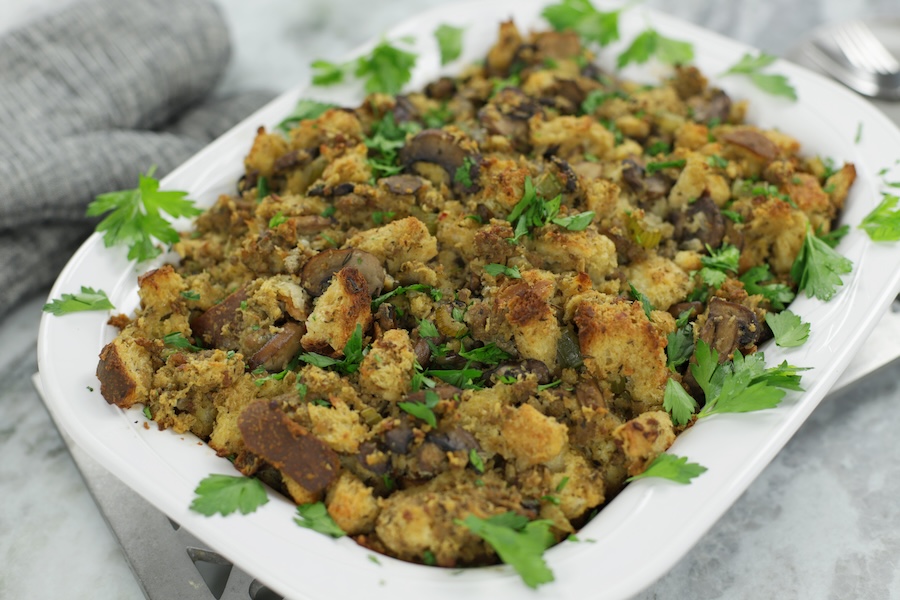
Sourdough for Bread Stuffing
Soft Sourdough Bread works wonderfully for bread stuffing because it absorbs moisture and flavors while maintaining a light texture. The subtle tang of sourdough complements the savory ingredients perfectly. While this recipe calls for soft sourdough, other varieties can work just as well—classic sourdough offers a heartier texture, whole wheat adds a nutty richness, and rye brings a bold, earthy flavor. You can even try sourdough with seeds or nuts for a bit of extra crunch.
Difference Between Stuffing and Dressing
The main difference between stuffing and dressing comes down to where it’s cooked—stuffing goes inside the bird, while dressing is baked separately in a dish. Though people often use the terms interchangeably, the method can change the texture and flavor. Either way, both bring that comforting, savory flavor we all love during the holidays.
Pro Tip: When stuffing the turkey, it’s best to use traditional sourdough bread. Its firm texture holds up inside the bird, absorbing the juices without turning soggy.
Ingredients Needed
- Sourdough Bread– The heart of the dish, Soft Sourdough offers a tangy flavor with a light yet sturdy texture, perfect for soaking up all the savory flavors.
- Olive Oil– Adds a smooth richness and helps sautéing the vegetables.
- Butter– Adds a creamy, luxurious texture while helping to sauté the vegetables. It also enhances the depth of the dried herbs’ flavors.
- Brown Onion– Also known as yellow onion, adds natural sweetness and depth, creating a rich, flavorful base for the stuffing.
- Celery– A traditional ingredient in stuffing, celery adds crunch and a mild, herbal note that lightens and balances the richness of the dish.
- Mushrooms– Cremini (Baby Bella), Shiitake or Oyster mushrooms brings in an earthy, umami richness, deepening the flavor while adding a satisfying, meaty texture.
- Garlic– Enhances the savoriness with a warm, aromatic kick.
- Thyme– Adds subtle earthiness and pairs beautifully with the other herbs.
- Marjoram– Brings a mild, slightly sweet herbal note.
- Sage– Provides an earthy, peppery flavor that’s essential for traditional stuffing.
- Rosemary– Adds a fragrant, pine-like sharpness that cuts through the richness.
- Ground Fennel– Offers a slightly sweet, anise-like flavor to balance the savory components.
- Italian Sausage– Adds savory, spiced depth and richness that complements the bread and vegetables.
- Salt and Pepper– Essential for bringing out and balancing all the flavors.
- Chicken Stock– Infuses moisture and savory depth into the bread, bringing the stuffing together.
- Eggs– Act as a binder, giving the stuffing structure.
How To Make
Drying Bread
- Preheat the oven to 250℉.
- Slice the bread, then tear it into chunks.
- Spread the pieces on a rimmed baking sheet and bake until fully dried and firm, stirring occasionally to ensure even baking.
- Let cool on baking sheet and then transfer to a large bowl.
Sautéing Veggies
- Heat olive oil and butter in a large frying pan over medium-high heat.
- Add the onions and celery, sautéing until the onions soften and the celery turns bright green, about 7-8 minutes.
- Stir in the mushrooms and cook until they release their moisture and reduce in size, about 4-5 minutes.
- Mix in the herbs, garlic, salt and pepper. Continue cooking for another 3-4 minutes, stirring frequently.
- Immediately add this mixture to the bread.
Cooking Sausage
- Place the frying pan over medium-high heat and add the Italian sausage, breaking it into smaller pieces as it cooks.
- Stir frequently and cook until browned, about 8-10 minutes.
- Transfer the sausage to the bread mixture. While the pan is still hot, add a small amount of broth to deglaze, scraping up the browned bits, then pour this into the bread bowl.
Assembly and Baking
- Preheat oven to 350℉.
- In a small bowl, whisk the eggs and stir into broth.
- Pour half of the broth mixture over the bread and stir thoroughly. Add the remaining broth and stir again.
- Let the stuffing sit for 5 minutes, then check if more broth is needed.
- Transfer the mixture to a 9×13 pan and bake, uncovered, for 30 minutes or until golden brown.
Note: For a softer, more tender stuffing without a crunchy top, cover with aluminum foil while baking, and remove the foil for the last 10 minutes to allow for light browning.
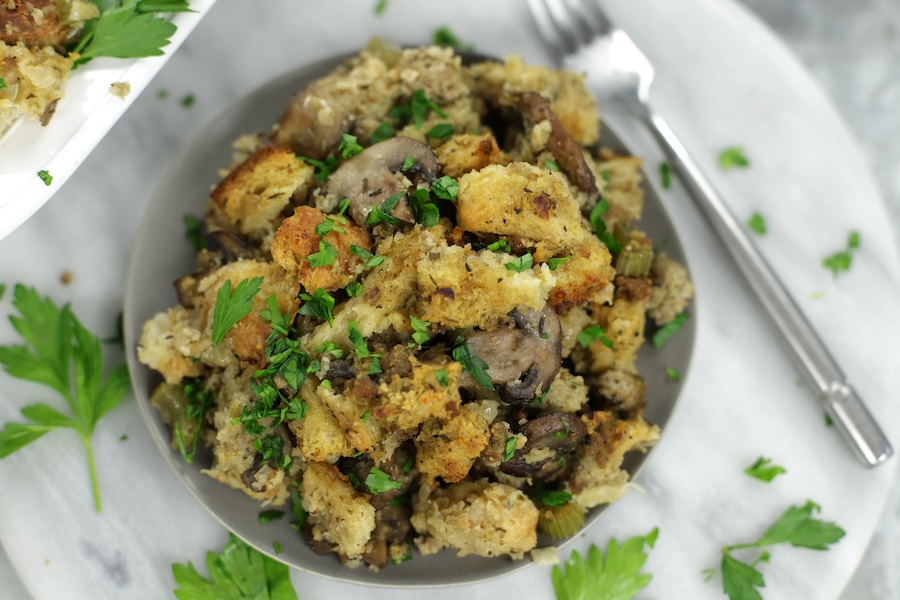
Recipe Tips When Making Sourdough Stuffing
- Dry the Bread Thoroughly– Whether you use freshly baked or day-old sourdough, it’s crucial to dry the bread completely. This ensures it absorbs the broth without becoming mushy. You can dry the bread chunks at room temperature for a day or two, or if short on time, bake them in a 250°F oven until fully dried and crisp.
- Season Generously– Bread tends to absorb flavors, so don’t hold back on the salt, pepper, and herbs. Taste as you go to ensure the seasoning is just right. The recipe provides a base, but feel free to adjust the seasoning to suit your taste—you may need a bit more to fully bring out the flavors.
- Cook Sausage Thoroughly and Deglaze Pan– Make sure the Italian sausage is fully cooked and nicely browned before adding it to the stuffing. The browning process enhances the flavor, adding a rich, caramelized taste. After cooking the sausage, deglaze the hot skillet with a small amount of broth, scraping up the browned bits. This step will add extra depth and savory notes to the stuffing.
- Make It Ahead– You can prepare the stuffing mixture a day in advance. Simply refrigerate it, covered, and bake it the next day. This allows the flavors to meld even more, giving you a deeper, richer taste.
Variations
Sourdough Stuffing is incredibly versatile, allowing you to tailor it to your favorite taste preferences. Here are just a few variations to try:
- Herb Variations– The base recipe uses rosemary, thyme, marjoram, and sage, but you can mix things up by adding herbs like fresh parsley, tarragon, or oregano for a brighter flavor. A touch of smoked paprika or ground coriander can also add warmth and depth.
- Meat Additions– Italian sausage adds a rich, savory element, but you can substitute it with Breakfast Sausage, Chorizo, bacon or pancetta.
- Fruit and Nut Twist– For a festive touch, add dried cranberries or chopped apples for a pop of sweetness, and toasted pecans or walnuts for extra crunch and depth.
- Bread Variations– While sourdough gives the stuffing a wonderful tang, you can experiment with other types of bread for a different flavor or texture. Try using multigrain for a heartier, nuttier bite, or focaccia for a subtle hint of herbs and olive oil. A cornbread version will give the stuffing a unique, slightly sweet Southern twist.
Freezing and Storage
For the best texture, allow the stuffing to cool completely before storing. Once cooled, transfer it to an airtight container. It will stay fresh in the refrigerator for up to 3-4 days.
If you’d like to freeze the stuffing, portion it into freezer-safe containers or bags, pressing out any excess air to avoid freezer burn. The stuffing can be frozen for up to 2 months. When you’re ready to reheat, thaw it overnight in the refrigerator. Reheat in a 350°F oven, covered, for 15-20 minutes until warmed through. Uncover during the last few minutes for a crisp top if desired.
Serving Suggestions for Sourdough Stuffing
- Roast Turkey or Chicken– A classic pairing, where the stuffing complements the rich flavors of roasted poultry.
- Pork Roast or Broiled Pork Chops– The hearty, slightly tangy sourdough works well with the savory, juicy pork.
- Prime Rib or Grilled Rib Eye Steaks– For a more indulgent meal, serve the stuffing alongside roasted or grilled beef.
- Fall Classics– Serve alongside other autumn classics like Roasted Butternut Squash, Creamy Mac and Cheese and Arugula Pear Salad.
- Gravy and Cranberry Sauce– Adding gravy enhances the savory flavors, while a spoonful of cranberry sauce adds a touch of tart sweetness.
Frequently Asked Questions
How do I cook the stuffing in a turkey?
To cook the stuffing in a turkey, first prepare the stuffing as directed, ensuring it’s completely cooled before placing it inside the turkey cavity. Loosely pack the stuffing to allow for even cooking. Roast the turkey until the internal temperature of the stuffing reaches 165°F to ensure food safety. Keep in mind that stuffing in a turkey may increase the overall roasting time.
Can other types of bread be used?
Yes, you can use a variety of breads like ciabatta, French bread, whole wheat, or even soft breads like brioche or challah, as long as they are thoroughly dried out to prevent any mushiness. Feel free to get creative with different types of bread to discover your personal preference. Experimenting with different textures and flavors can give the stuffing a unique twist that suits your taste!
What can I replace the fennel with?
Since fennel has an anise or licorice-like flavor, some may find it unappealing. It’s fine to simply omit it or increase any of the other herbs by 1/2 to 1 teaspoon.
How do I know when I have added enough broth?
You’ll know you’ve added enough broth when the stuffing is moist but still holds its shape. To check, take a small handful of the mixture and gently squeeze it—if it holds together without crumbling but doesn’t feel soggy or have liquid dripping out, it’s just right. If the stuffing feels dry, add more broth gradually. You want it to be moist enough to bind together but still light and fluffy, not dense or overly wet.
Can freshly baked sourdough be used for this recipe?
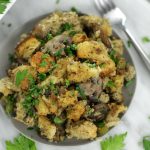
Sourdough Stuffing
Equipment
- 9×13 casserole pan
- 12 inch skillet pan
Ingredients
- 1 loaf Soft Sourdough Bread *2 pound loaf, torn into pieces- See Note #1 below for personalizing the stuffing
- 2 tablespoons olive oil
- 4 tablespoons butter *either salted or unsalted
- 2 cups diced yellow onion (aka brown onion) *about 1 large onion
- 1 1/2 cups diced celery *about 4 large stalks
- 16 ounces mushrooms
- 4 large garlic cloves *minced or crushed, about 1 tablespoon
- 2 teaspoons thyme
- 2 teaspoons marjoram
- 1 teaspoon ground sage
- 2 teaspoons ground rosemary
- 1/2 teaspoon ground fennel *optional
- 1 pound Italian Sausage
- salt & pepper to taste *approximately 1-2 teaspoons salt and 1/2 teaspoon pepper
- 2 large eggs
- 3 1/2 cups chicken stock
Instructions
Drying Bread
- Preheat oven to 250 ℉.
- Slice the bread and tear it into bite-sized chunks.
- Arrange bread pieces in a single layer on a rimmed baking sheet. Bake, stirring occasionally, until they're completely dried and firm. See Note #2 below.
- Allow the bread to cool on the sheet before transferring to a large bowl.
Sautéing Veggies
- Heat olive oil and butter in a large skillet over medium-high heat.
- Add the onions and celery, sautéing until the onions soften and the celery turns bright green, about 7-8 minutes.
- Stir in the mushrooms and cook until they release their moisture and reduce in size, about 4-5 minutes.
- Mix in the herbs, garlic, salt, and pepper, and continue to sauté for another 3-4 minutes, stirring frequently.
- Immediately transfer the vegetable mixture to the bread.
Cooking Sausage
- Place the skillet pan back over medium-high heat and add the Italian sausage, breaking it into smaller pieces as it cooks.
- Stir frequently and cook until browned, about 8-10 minutes.
- Transfer the cooked sausage to the bread mixture. While the pan is still hot, pour in a small amount of broth to deglaze, scraping up the browned bits, and then pour this into the bread bowl.
Assembly and Baking
- Preheat oven to 350℉.
- In a small bowl, whisk the eggs and stir into broth.
- Pour approximately 1 1/2 cups of the broth mixture over the bread and stir well. Let rest for 5 minutes and then add another 1 1/2 cups of broth and stir again.
- Let the stuffing rest again for 5 minutes, then check if another 1/2 cup of broth is needed. See Note #3 below.
- Transfer the mixture to a 9×13 pan and bake, uncovered, for 30 minutes, or until golden brown.

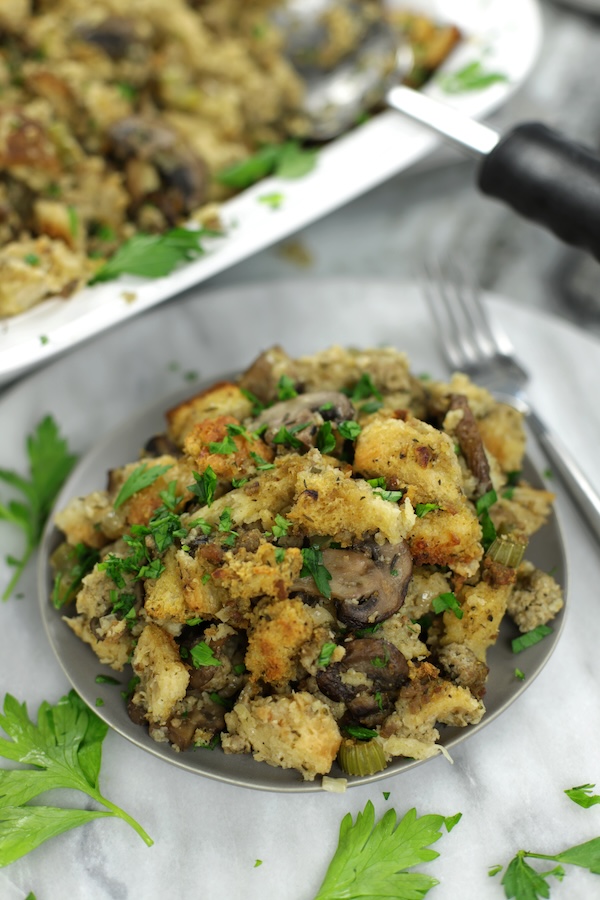
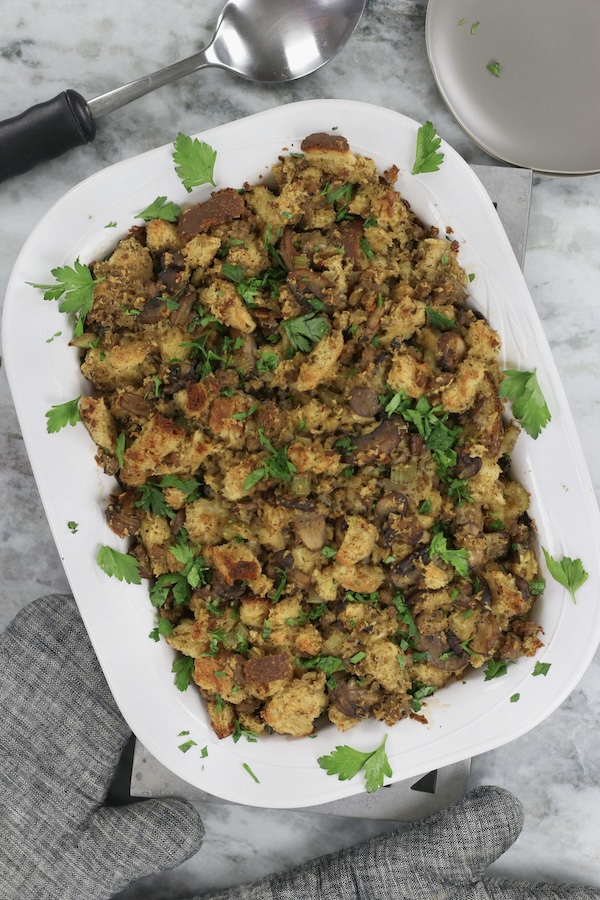
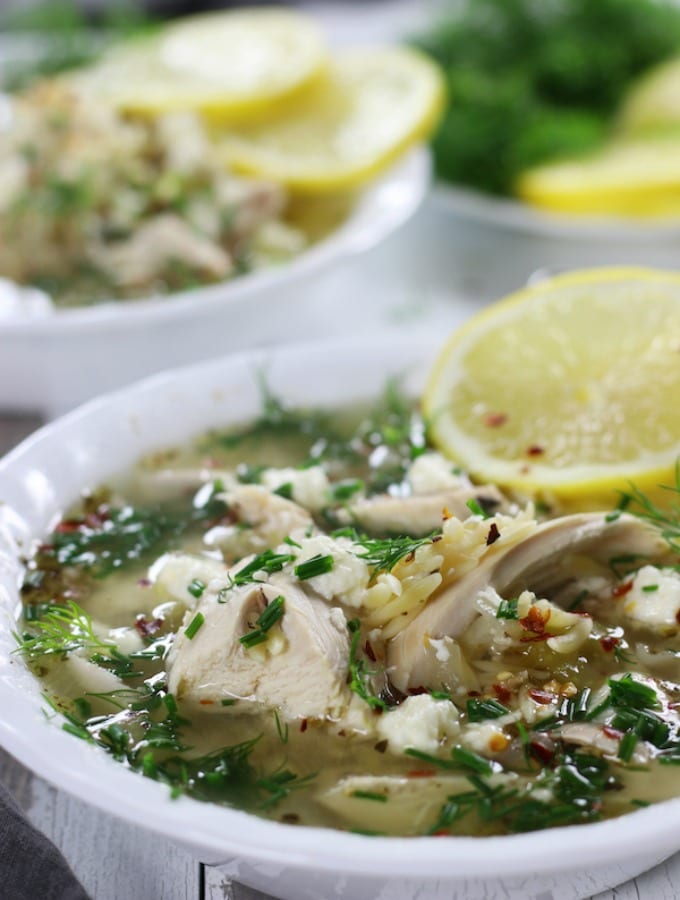
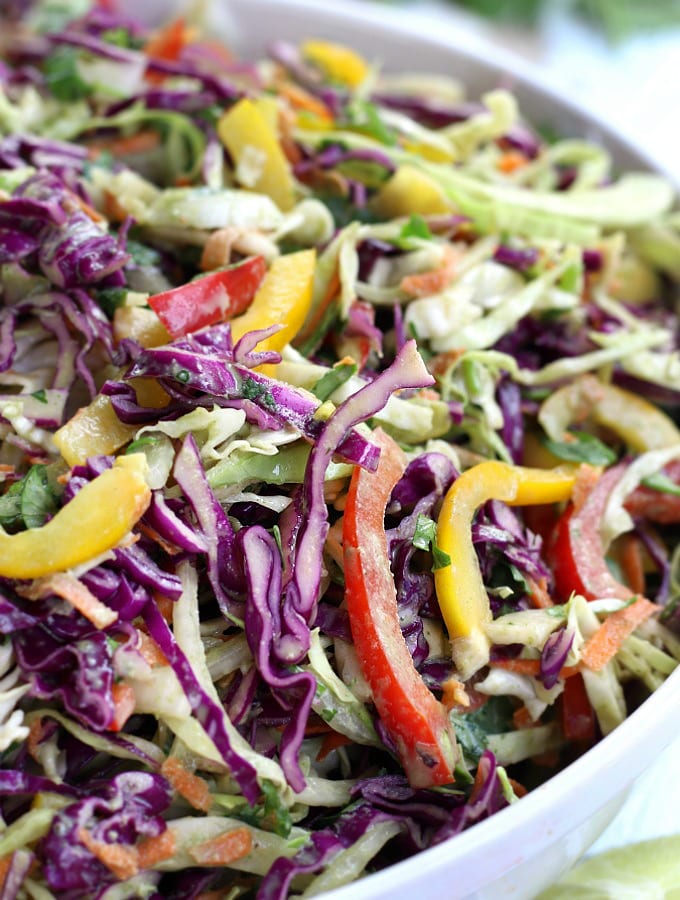

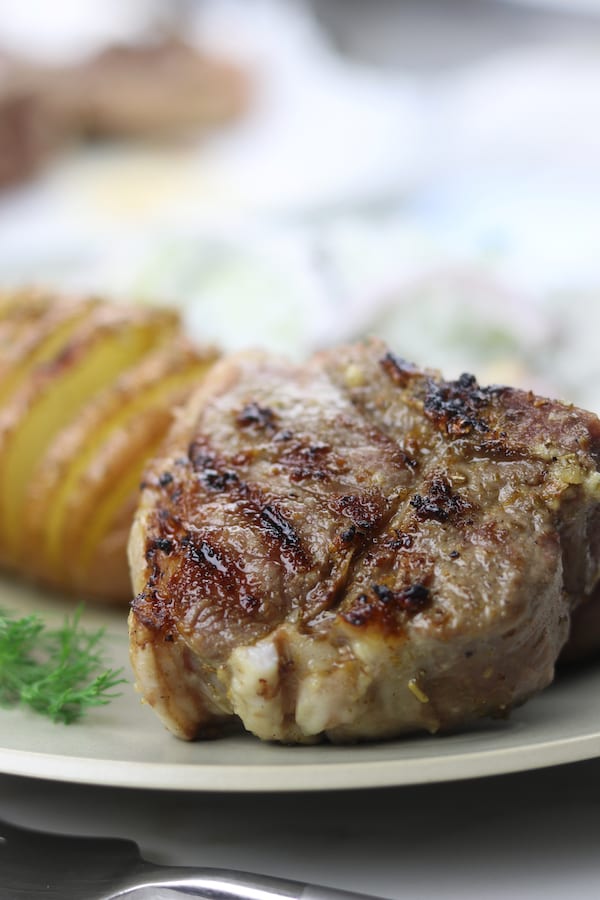
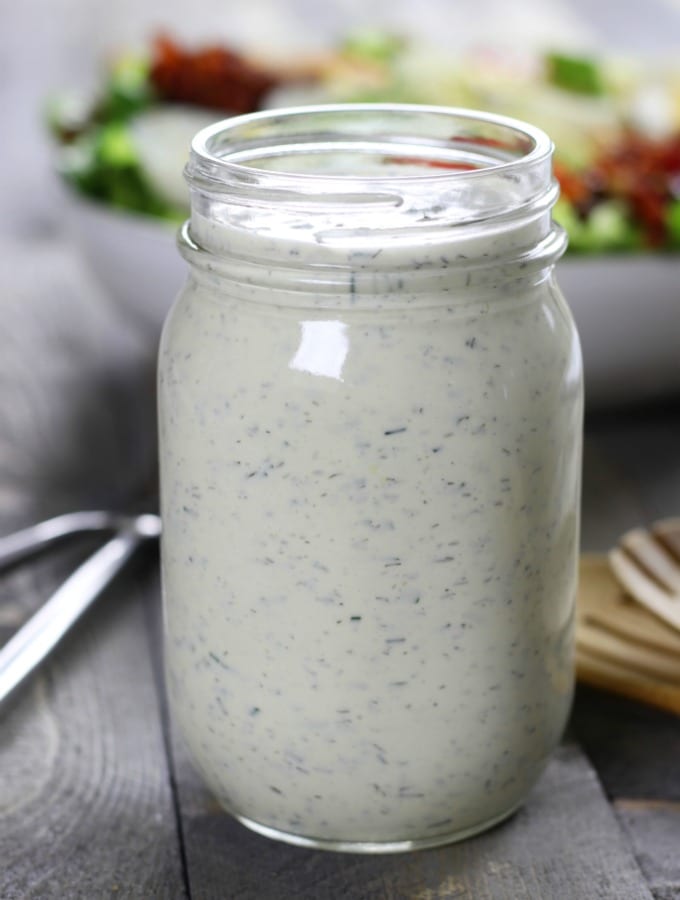
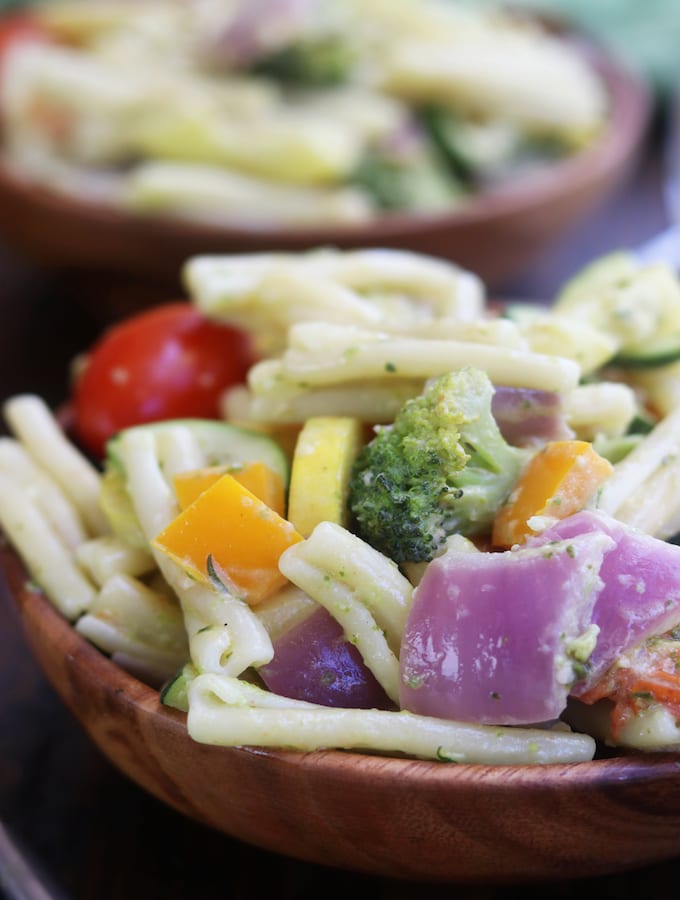
Sourdough stuffing?? What a good idea. I’m sad I just found this the week after Thanksgiving, but my husband’s work party is coming up, so maybe I’ll take a shot at it then. They’re a bunch of carpet cleaners, so they’re not too picky 😅